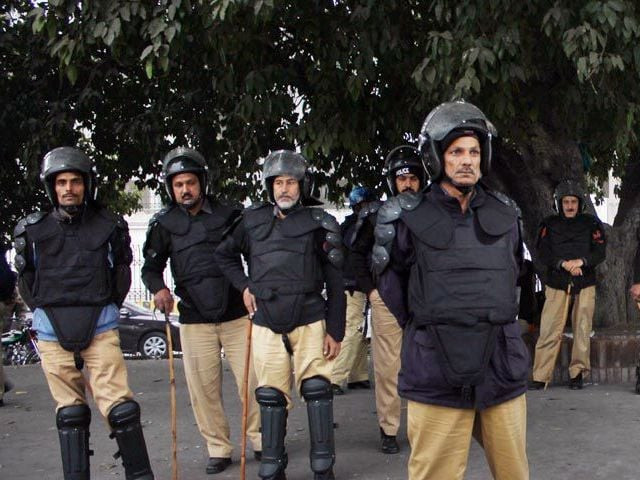Fighting crime & terrorism through technology
Digitisation of Criminal Record Office is part of a larger effort to develop an integrated criminal profiling system

PHOTO: ONLINE
As a baseline, the system in Punjab has digitised all 26 registers maintained in a police station, including FIRs (register one). Currently this system is fully functional in 228 police stations in Punjab, and over 160,000 FIRs have been registered in it. Alongside the FIR, the system also automates the maintenance of many other important registers, including register 10 (surveillance register) and register two (daily journal). The system will be rolled out in all 709 police stations in Punjab in the next few months.
Good governance and its digital dividend
Recently, there has been a lot of debate about making FIRs ‘online’, such that anyone can lodge an FIR by either going online or sending an email. Since an FIR invariably mandates arrest of individuals, it cannot be registered without a modicum of due diligence. However, it is important to make it completely painless for a citizen to report the equivalent of a ‘ruppat’, and to make the police station accountable for disposing of these complaints properly. Therefore, alongside the computerised FIR system, the Punjab Information Technology Board has devised a computerised ‘front-desk’ system, whose purpose is to capture complaints of all citizens walking into the police station, regardless of whether they are cognisable or non-cognisable under the Criminal Procedure Code. These complaints are resolved within 72 hours by the SHO, by either turning them into an FIR or recording a reason for not doing so. An independent cadre of IT-savvy officers enters the data in this system, and the complainant is kept informed via SMS at every step of the complaint resolution. The concerned SP, based on the data from this complaint system, monitors the performance of the SHOs. Over 128,000 complaints have been entered in this system so far. Shortly, we plan to make this complaint system online and accessible over a smartphone application for citizens.
In four districts in Punjab — Sargodha, Faisalabad, Vehari and Lahore — each instance of crime reported in the system is also geo-tagged by the investigating officer by using an Android phone application. Modelled after the NYPD’s CompStat system, over 173,000 crime incidences have been geo-tagged to date. Geo-tagged crime data enables the police to do spatial analysis of the crime trends. DPOs have started to use this analysis to plan police patrols and check posts. Shortly, smartphone applications will be released for citizens to receive crime alerts based on this analysis.
Geo-tagging database: Punjab maps location of 11,000 madrassas
A large percentage of crime can be prevented by effective surveillance and tracking of known criminals; studies have shown that close to 70 per cent of crime is carried out by people with a criminal history. In the last six months, we have replaced manual (paper-based) “10-print cards” kept in the Criminal Record Office (CRO) with digital biometric data. A single CRO in Lahore has been replaced with CROs in all 36 districts in Punjab, connected to a central criminal database. This has resulted in dozens of criminals being caught in the last two months by digitally matching the fingerprints from the crime scene with the digitised CRO database.
Digitisation of the CRO is part of a larger effort to develop an integrated criminal profiling system. This new profiling system combines data from CNIC, CRO, call data records, vehicle ownership records, land ownership data, driving licence, arms licence, urban property tax information, tenant information, hotel check-ins and prisoner data to enhance the surveillance and investigation capability of law-enforcement agencies. This data is systematically being made accessible on handheld biometric devices. Around 1,000 handheld devices have already been given to law enforcement agencies and are used in all counterterrorism search operations. In the last six months, over 113,000 verifications have been performed using these handheld devices. The system will also include data from Police Beat Books, the traditional surveillance registers maintained by the police, which were recently digitised across Punjab.
Digitising criminal records: CNICs, cell phone numbers to be included in FIRs
As part of the National Action Plan, all madrassas in Punjab have been geo-tagged using our smartphone applications. This exercise has produced a digital record of the students, visitors and any foreigners in over 13,800 madrassas across the province. Likewise, an extensive exercise is underway to geo-tag and biometrically verify close to 256,000 Afghan refugees in Punjab. We have found that almost one-third of refugees are now living in districts different from the ones shown on their original POR card.
Automation of the police will help address the thana culture in the province. Police stations are being equipped with special reception desks for citizens, which will run a complaint system. A special helpline has been set up in the IG office (8787) where citizens can lodge complaints against police behaviour. Complaints on this helpline are monitored personally by the IG and a dedicated cell ensures satisfactory closure of complaints. Furthermore, all police stations and police lines are being equipped with biometric attendance devices, which will also be used to capture fingerprints of detained offenders.
After developing these systems for over a year, we are now in a position to make these systems accessible on the web and through smartphone applications, such that citizens can receive crime alerts, initiate complaints, report suspicious activities and track investigations of their reported cases.
Published in The Express Tribune, January 31st, 2016.
Like Opinion & Editorial on Facebook, follow @ETOpEd on Twitter to receive all updates on all our daily pieces.













COMMENTS
Comments are moderated and generally will be posted if they are on-topic and not abusive.
For more information, please see our Comments FAQ